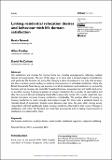Files in this item
Linking desires and behaviour of residential relocation with life domain satisfaction
Item metadata
| dc.contributor.author | Nowok, Beata | |
| dc.contributor.author | Findlay, Allan MacKay | |
| dc.contributor.author | McCollum, David | |
| dc.date.accessioned | 2016-10-11T08:30:14Z | |
| dc.date.available | 2016-10-11T08:30:14Z | |
| dc.date.issued | 2018-03-01 | |
| dc.identifier | 244739865 | |
| dc.identifier | 7c9147a7-fc97-47bc-a910-160ceeeff66e | |
| dc.identifier | 85042168977 | |
| dc.identifier | 000425065500011 | |
| dc.identifier.citation | Nowok , B , Findlay , A M & McCollum , D 2018 , ' Linking desires and behaviour of residential relocation with life domain satisfaction ' , Urban Studies , vol. 55 , no. 4 , pp. 870-890 . https://doi.org/10.1177/0042098016665972 | en |
| dc.identifier.issn | 0042-0980 | |
| dc.identifier.other | ORCID: /0000-0001-8716-6852/work/60196111 | |
| dc.identifier.uri | https://hdl.handle.net/10023/9638 | |
| dc.description | The authors gratefully acknowledge financial support for this research from the Economic and Social Research Council (ESRC) Centre for Population Change (grant number RES-625-28-0001). | en |
| dc.description.abstract | Life satisfaction and motives for moving home are complex entanglements, reflecting multiple desires and experiences. The aim of this paper is to show that a focused analysis of satisfaction with particular life domains can prove that changing a place of residence is not only a life stressor, but also a positive means leading to enduring improvements in individual satisfaction. Using the British Household Panel Survey we examine overall life satisfaction and satisfaction in various life domains such as housing, job, social life, household income, spouse/partner and health, both prior to and after moving. A temporal pattern of movers’ satisfaction for a number of years before and after the move is derived employing a fixed-effects panel data model. Our results reveal that residential relocation increases housing satisfaction considerably. The positive effect of moving on housing satisfaction is much stronger and endures longer for those with a sustained desire to relocate ahead of movement. Despite some decrease over time, five years after moving survey respondents still had significantly higher housing satisfaction than before their move. Changes in satisfaction with other life domains are much less pronounced and no lasting improvements in satisfaction are observed for them. | |
| dc.format.extent | 768977 | |
| dc.language.iso | eng | |
| dc.relation.ispartof | Urban Studies | en |
| dc.subject | Life domain satisfaction | en |
| dc.subject | Mobility desires | en |
| dc.subject | Panel models | en |
| dc.subject | Residential migration | en |
| dc.subject | Subjective wellbeing | en |
| dc.subject | HN Social history and conditions. Social problems. Social reform | en |
| dc.subject | 3rd-DAS | en |
| dc.subject.lcc | HN | en |
| dc.title | Linking desires and behaviour of residential relocation with life domain satisfaction | en |
| dc.type | Journal article | en |
| dc.contributor.sponsor | Economic & Social Research Council | en |
| dc.contributor.institution | University of St Andrews. School of Geography & Sustainable Development | en |
| dc.identifier.doi | 10.1177/0042098016665972 | |
| dc.description.status | Peer reviewed | en |
| dc.identifier.grantnumber | ES/K007394/1 | en |
This item appears in the following Collection(s)
Items in the St Andrews Research Repository are protected by copyright, with all rights reserved, unless otherwise indicated.

